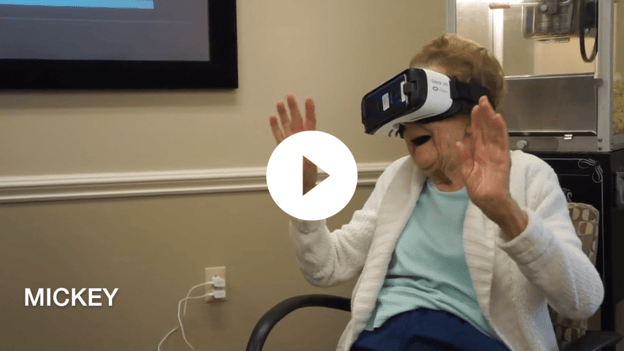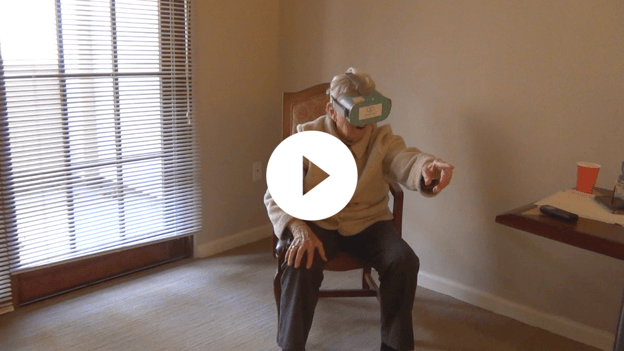Share this
Virtual Reality for Dementia
by Rendever on Nov 7, 2022 6:05:28 PM
Some of the most common questions we get asked are: “How does VR work with people who have dementia? Can you use VR with people with Alzheimer’s Disease?”
If you’re a caregiver for someone with one of these diseases, you won’t be surprised to know: the resounding answer is, it depends.
To really understand how to provide the best impact with the right approach, you need to first ask yourself, “What is the effect I’m hoping for? Is it to improve their quality of life? Is it to decrease anxiety? Is it to help manage behavioral symptoms? Or is it to improve your connection as a caregiver?”
Virtual reality (VR) for seniors with dementia is a growing field, and the concept is a subset of VR for seniors, which is becoming one of the most well-documented use cases. Let’s start from the top with the research.
Research on VR for Dementia
Research has shown that VR is safe for older adults with mild cognitive impairment (MCI) and people living with Dementia (PLWD) and has the power to improve mood and quality of life (Afifi et al., 2021, D’Cunha et al., 2019). Reports from PLWD show that VR is an enjoyable activity that can increase feelings of pleasure, empowerment or sense of control over their environment, and quality of life (Moyle et al., 2018, Appel et al., 2021). In addition to increasing quality of life and wellbeing, VR has been shown to reduce or even reverse cognitive decline in PLWD (Optale et al., 2010).
Research is also highlighting the impact of virtual reality on social isolation, which is tightly tied with the development of dementia. Studies show that prolonged social isolation leads to a 50% increase in risk of dementia [Kuiper et al. 2015], as well as a faster progression of cognitive impairment [Grande et al., 2018]. In fact, Rendever is currently in the midst of a clinical trial looking at the impact of different forms of technology on quality of life and family connections in older adults living in senior communities.
In general, people with mild cognitive impairment (MCI) are receptive to VR and new technology. It’s similar for those with mild dementia, and we’ve seen profound success using certain forms of VR for people with moderate dementia. It gets trickier as the disease progresses.
Where VR for Dementia is Most Impactful
If the goal is to manage behavioral symptoms, it’s likely better to turn to other solutions first. If someone is actively sundowning and presenting with anxiety, especially environmentally driven anxiety, removing them from the environment with a headset is not recommended. Once you’ve spent the time validating their experience and their emotions, there may be an opportunity to use VR, but it’s on a case-by-case basis.
That being said, we’ve seen some incredible senior living staff members introduce VR as a redirection tool ahead of someone’s predicted sundowning schedule. The right relaxing experience matched to the right individual can be incredibly therapeutic, and in some cases even prevent or delay symptoms of sundowning and other daily challenges.
As you probably know, Alzheimer’s Disease and other dementias have a long and drawn out progression of symptoms. Things may start slowly, and (hopefully) slowly progress. It’s a disease that affects people differently, often day-by-day. While every symptom may not last forever, many do and gradually get worse.
One of the symptoms that is especially challenging, especially when it comes to social isolation, is expressive aphasia. As they say, a video paints a thousand words, so we’d like to show the potential of VR for dementia, specifically aphasia.
The transformation that we saw in Mickey was special, and we’re working to understand the underlying mechanisms at play. Regardless of mechanism, there’s no doubt that these VR sessions gave her a profound improvement in her quality of life. She started communicating again, much to the joy of her and her caregivers! At Rendever, we’re working day-in and day-out to provide these same experiences to seniors across the globe.
Reminiscence Therapy
Reminiscence Therapy is a commonly used tool for evoking memories of the past in PLWD. It involves activating the senses oftentimes through sight to help older adults to recall and remember fond memories associated with people, events, and places. Conventional still photos were one of the main forms of media tools for sight stimulation. With the use of immersive VR technology in reminiscence therapy, studies have shown significantly greater improvements in cognitive score (revised PGC) on wellbeing especially in agitation, attitude towards one’s aging and loneliness dissatisfaction compared to using a photo as the only form of media (Tominari et al., 2021). In fact, research on reminiscence therapy using VR reveals tremendous improvements in ratings of depression and feelings of life satisfaction (Liu et al., 2021). As we incorporate VR as a novel tool for reminiscence therapy, more research is needed to understand the long term impact and effect of VR compared to other/standard forms of reminiscence therapy tools.
At Rendever, we are incorporating the element of reminiscence therapy in our clinical trial, such as revisiting important places from their life and viewing family photos with loved ones. We also encourage new experiences and strengthen relationships between older adults and family members through traveling around the world. The video below showcases the novel travel experience in Safari in South Africa.
As you can see at the end, Rosemary and her son actually start reminiscing, and they continue the conversation, which is extremely powerful. It's one thing for Rosemary to react the way she’s reacting, it's another for the family member to virtually be there responding to her reactions, creating a dialogue together. This is where we see this technology providing the most benefit in providing positive moments towards something that is truly beneficial and, in this case, therapeutic.
How to Get Started
VR for dementia is one of many use cases of VR for seniors. Learn more about this and others by checking out Moments from the Field. Also, check out how Rendever works and reach out to see how it can be used with those you care for. You won't regret it: Book a meeting!
To learn more, email us at hello@rendever.com or call us at (857) 800-8032
References
Afifi, T., Collins, N. L., Rand, K., Fujiwara, K., Mazur, A., Otmar, C., ... & Logsdon, R. (2021). Testing the feasibility of virtual reality with older adults with cognitive impairments and their family members who live at a distance. Innovation in aging, 5(2), igab014.
Appel, L., Ali, S., Narag, T., Mozeson, K., Pasat, Z., Orchanian-Cheff, A., & Campos, J. L. (2021). Virtual reality to promote wellbeing in persons with dementia: A scoping review. Journal of Rehabilitation and Assistive Technologies Engineering, 8, 20556683211053952.
D’Cunha, N. M., Nguyen, D., Naumovski, N., McKune, A. J., Kellett, J., Georgousopoulou, E. N., ... & Isbel, S. (2019). A mini-review of virtual reality-based interventions to promote well-being for people living with dementia and mild cognitive impairment. Gerontology, 65(4), 430-440.
Grande, G., Vetrano, D. L., Cova, I., Pomati, S., Mattavelli, D., Maggiore, L., ... & Rizzuto, D. (2018). Living alone and dementia incidence: a clinical-based study in people with mild cognitive impairment. Journal of Geriatric Psychiatry and Neurology, 31(3), 107-113.
Liu, Z., Yang, F., Lou, Y., Zhou, W., & Tong, F. (2021). The Effectiveness of Reminiscence Therapy on Alleviating Depressive Symptoms in Older Adults: A Systematic Review. Frontiers in Psychology, 12.
Moyle, W., Jones, C., Dwan, T., & Petrovich, T. (2018). Effectiveness of a virtual reality forest on people with dementia: A mixed methods pilot study. The Gerontologist, 58(3), 478-487.
Optale, G., Urgesi, C., Busato, V., Marin, S., Piron, L., Priftis, K., ... & Bordin, A. (2010). Controlling memory impairment in elderly adults using virtual reality memory training: a randomized controlled pilot study. Neurorehabilitation and neural repair, 24(4), 348-357.
Tominari, M., Uozumi, R., Becker, C., & Kinoshita, A. (2021). Reminiscence therapy using virtual reality technology affects cognitive function and subjective well-being in older adults with dementia. Cogent Psychology, 8(1). https://doi.org/10.1080/23311908.2021.1968991
Share this
- Uncategorized (43)
- virtual reality (29)
- VR (27)
- seniors (25)
- agetech (17)
- resident engagement (17)
- activity professionals (10)
- senior living technology (9)
- VirtualReality (7)
- RendeverLive (6)
- aging tech (6)
- Expanding Worlds (5)
- older adults (5)
- Press Release (3)
- assisted living (3)
- hospice (3)
- special events (3)
- TimeBestInventions (2)
- bucket list (2)
- mental health (2)
- sales (2)
- social isolation (2)
- GameDev (1)
- LeadingAge (1)
- NewHire (1)
- OpenSource (1)
- PalmsatLaQuinta (1)
- StephanieStallings (1)
- TiltBrush (1)
- alcove (1)
- ces (1)
- family (1)
- multibrush (1)
- research (1)
- January 2026 (1)
- December 2025 (1)
- November 2025 (2)
- October 2025 (1)
- September 2025 (1)
- August 2025 (3)
- July 2025 (5)
- June 2025 (3)
- May 2025 (6)
- April 2025 (3)
- March 2025 (3)
- February 2025 (2)
- January 2025 (2)
- December 2024 (2)
- November 2024 (4)
- October 2024 (1)
- August 2024 (1)
- July 2024 (1)
- May 2024 (1)
- January 2024 (1)
- December 2023 (1)
- September 2023 (1)
- April 2023 (2)
- February 2023 (2)
- January 2023 (7)
- December 2022 (1)
- November 2022 (3)
- October 2022 (2)
- August 2022 (1)
- July 2022 (1)
- June 2022 (2)
- May 2022 (1)
- April 2022 (2)
- March 2022 (2)
- February 2022 (1)
- January 2022 (6)
- December 2021 (1)
- November 2021 (3)
- October 2021 (1)
- September 2021 (2)
- August 2021 (1)
- April 2021 (2)
- March 2021 (4)
- February 2021 (3)
- January 2021 (6)
- November 2020 (1)
- October 2020 (2)
- August 2020 (2)
- July 2020 (2)
- June 2020 (1)
- March 2020 (4)
- October 2019 (1)
- August 2019 (2)
- July 2019 (1)
- March 2019 (1)
- December 2018 (1)
- August 2018 (1)
- July 2018 (2)
- June 2018 (3)
- April 2018 (1)
- December 2017 (2)
- November 2017 (1)
- October 2017 (2)
- September 2017 (1)
- August 2017 (1)
- July 2017 (1)


No Comments Yet
Let us know what you think